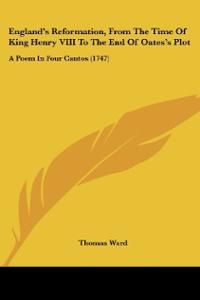SCARCE 1ST EDITION WORK BY THOMAS wARD : England's Reformation, (from the Time of K. Henry VIII. to the end of the Oates's Plot. A Poem in Four Cantos. London 1715. 1st edition. 12mo, , 2 volumes bound in one. 312p + 209p. The first edition does not have the plates issued with some later editions Contemporary full calf, very worn, joints cracked but boards still attached
Born at Danby Castle near Guisborough, Yorkshire, 13 April, 1652; d. at St-Germain, France, 1708. He was the son of a farmer and was educated as a Presbyterian at Pickering School. Henry Wharton asserted that he had been a Cambridge scholar but this is not certain. Having acted for a time as private tutor he was led by his theological studies to become a Catholic. He travelled in France and Italy, and for five or six years held a commission in the papal guard, seeing service against the Turks. On the accession of James II (1688) he returned to England and employed his learning in controversy. His most popular work, "England's Reformation", is a poem in four cantos in the metre of "Hundibras". It first appeared posthumously in 1710, and since then in several editions.
Thomas Ward (1652-1708) controversalist, embraced Romanism."He had been brought up as a presbyterian or Calvinist, but his studies in theological controversy induced him to join the Roman catholic church. Subsequently he travelled in France and Italy. At Rome he accepted a commission in the pope's guards, and he remained in the service for five or six years, during which time he served in the maritime war against the Turks. In 1685 he returned to England. He took a leading part in the controversy of 1687-8, as a ‘Roman catholick soldier;’ but Dr. Tillotson believed he was really a jesuit in disguise, while Henry Wharton assured the public that the soldier was originally a Cambridge scholar, and had exchanged his black coat for a red one.
Hobson's choice is an apparently free choice which is really no choice at all. The phrase is said to originate from Thomas Hobson (1544–1630), a livery stable owner at Cambridge, England who, in order to rotate the use of his horses, offered customers the choice of either taking the horse in the stall nearest the door—or taking none at all.
The first known written usage of this phrase is in Joseph Addison's paper The Spectator (October 14, 1712), though it also appears in Thomas Ward's 1688 poem "England's Reformation", not published until after Ward's death. Ward wrote, "Where to elect there is but one, / 'Tis Hobson's choice—take that, or none." Charlotte Perkins Gilman uses the phrase in her novel "Herland".
